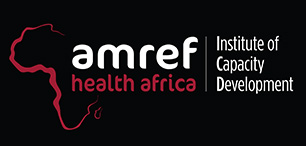COVID-19 is rapidly spreading across the world; by the end of March 2021, Kenya had reported a total number of 132,635 confirmed cases with 2,147 deaths. To reduce the spread, Kenya adopted World Health Organisation (WHO) strategies to interrupt human-to-human transmission including: (1) reducing secondary infections among close contacts and health care workers, (2) inhibiting transmission amplification events, and (3) training health workers for early detection of suspected cases, diagnosis, and management. Drawing from more than 60 years’ experience in health systems strengthening and community-led change, Amref Health Africa is working closely with regional ministries of health, alongside WHO in implementing preventive measures to curb the spread of COVID-19 and strengthen frontline health worker resilience.
As part of Amref Health Africa’s continental response to COVID-19, the Institute of Capacity Development (ICD) led the implementation of a 6-month GSK funded ‘COVID-19 Stop the Spread’ project in Kenya through the following interventions:
- Training of frontline health workers (Community Health Volunteers and Health Care Professionals (HCPs) to strengthen surveillance, infection prevention, monitoring and referral mechanisms, and diagnostics.
- Promoting the health and safety of health workers (occupational and psychological).
- Advocacy and increasing awareness on COVID – 19 prevention and control at community level including hard to reach areas.
The project had three key approaches based on the three project objectives:
- COVID-19 content creation and digitisation for CHVs and HCPs
- COVID-19 Content modules for HCPs development and digitisation
- Training of HCPs through Jibu
- Training of CHVs through Leap
- Tele-counselling support to MOH
- Finalised, digitised and deployed a mental health curriculum and manual for Community Health Assistants (CHAs) and the community health cadre
- Conducted a knowledge, attitude and practice (KAP) survey in Meru Country to better understand mental health needs/gaps, and implement select strategies
- Supported the Meru County Mental Health Task Force to develop a handbook of sensitisation messages to address the issues around stigma and social discrimination.
The project contributed in strengthening COVID-19 surveillance, monitoring and referral mechanisms and, diagnostics in Kenya through equipping the frontline health workers with the necessary knowledge and skills to respond to the pandemic. The Mental Health KAP survey alluded a huge gap on mental health and psychosocial care hence potential areas for future collaboration.
Training of healthcare professionals through Jibu Platform
- GSK
- Amref Health Africa (Institute of Capacity Development, Amref Health Innovations, Amref Laboratory)
Diana Mukami – Head of Programmes and Digital Learning Director | Institute of Capacity Development – diana.mukami@amref.org
